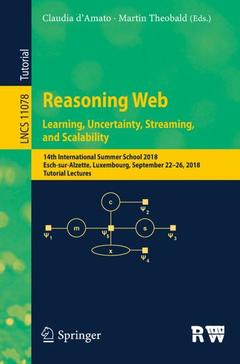Description
Reasoning Web. Learning, Uncertainty, Streaming, and Scalability, 1st ed. 2018
14th International Summer School 2018, Esch-sur-Alzette, Luxembourg, September 22–26, 2018, Tutorial Lectures
Information Systems and Applications, incl. Internet/Web, and HCI Series
Coordinators: d’Amato Claudia, Theobald Martin
Language: English
Subjects for Reasoning Web. Learning, Uncertainty, Streaming, and...:
Support: Print on demand
Description
/li>Contents
/li>Biography
/li>Comment
/li>
This volume contains lecture notes of the 14th Reasoning Web Summer School (RW 2018), held in Esch-sur-Alzette, Luxembourg, in September 2018.
The research areas of Semantic Web, Linked Data, and Knowledge Graphs have recently received a lot of attention in academia and industry. Since its inception in 2001, the Semantic Web has aimed at enriching the existing Web with meta-data and processing methods, so as to provide Web-based systems with intelligent capabilities such as context awareness and decision support. The Semantic Web vision has been driving many community efforts which have invested a lot of resources in developing vocabularies and ontologies for annotating their resources semantically. Besides ontologies, rules have long been a central part of the Semantic Web framework and are available as one of its fundamental representation tools, with logic serving as a unifying foundation. Linked Data is a related research area which studies how one can make RDF data available on the Web and interconnect it with other data with the aim of increasing its value for everybody. Knowledge Graphs have been shown useful not only for Web search (as demonstrated by Google, Bing, etc.) but also in many application domains.
Made for students, researchers and practitioners interested in Knowledge Graphs, Question Answering, and Semantic Web
Thoroughly revised tutorials cover logical foundations for constructing and querying knowledge graphs, linked data, semantics, fuzzy RDF and OWL knowledge bases
Original, readable and useful lecture notes




